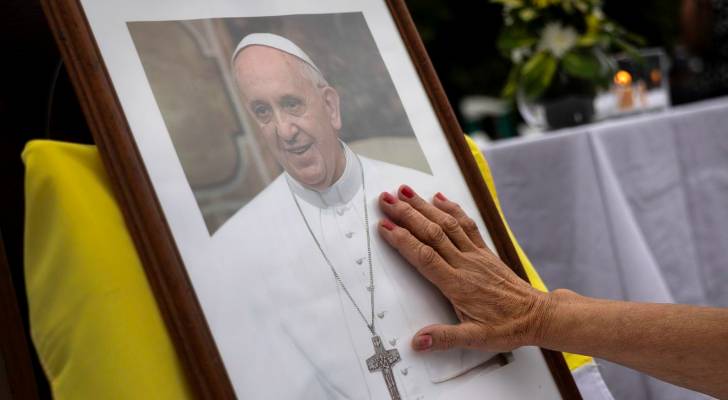People mourning Pope Francis (Credit: Getty Images)
"Israel" orders diplomats to remove posts mourning Pope Francis
A wave of diplomatic discontent has erupted within "Israel’s" foreign service following orders to remove official condolences issued after the death of Pope Francis.
The move, which many believe was driven by political sensitivities surrounding the pontiff’s criticism of the Israeli Occupation's actions in Gaza, has sparked internal backlash and concern over the country’s global image.
Following news of the pope's passing, several "Israeli" embassies posted tributes across their social media platforms. One now-deleted message read, “Rest in peace, Pope Francis. May his memory be a blessing.” However, the Ministry of Foreign Affairs later issued directives for all such posts to be taken down without any public explanation.
The decision provoked strong reactions among "Israeli" diplomats. According to Yedioth Ahronoth, some ambassadors voiced frustration in internal WhatsApp channels, warning that the deletion could be seen as disrespectful to the global Catholic community.
“We are deleting a simple, innocent tweet that expresses basic condolences – and it is clear to everyone that this is only because of the Pope's criticism of Israel for the fighting in Gaza,” one diplomat reportedly said.
Another ambassador revealed they were given “an unequivocal order to delete” their tribute, and were told only that the matter was “under review.” The same ambassador added, “This does not satisfy us, and certainly not the public to whom we represent Israel.”
In addition to the deleted posts, diplomats were reportedly told not to sign condolence books at Vatican missions around the world. Former "Israeli" Ambassador to the Vatican Raphael Schutz called the ministry’s handling of the situation a "mistake," arguing that political differences should not override the basic gesture of mourning.
“Now, we’re not only talking about a head of state, but also a spiritual leader for over a billion people—nearly 20 percent of humanity,” he told The Jerusalem Post. “I don’t think silence sends the right message.”
Foreign ministry officials later told The Jerusalem Post that the condolence messages were “posted in error,” stating, “We responded to the Pope’s statements against Israel and the war during his lifetime, and we will not do so after his death. We respect the feelings of his believers.”
Not all officials supported public mourning, however. Former ambassador to Italy, Dror Idar, argued that "Israel" should not send any representatives to the pope’s funeral, accusing the pontiff of inciting antisemitism.
Still, others warned that absence from such a high-profile international event would be detrimental. “If we are absent, it will be conspicuous and reflect poorly on us,” said Schutz. “It could reinforce a sense of isolation, already heightened by the ongoing war.”
Pope Francis, who passed away at the age of 88, was a vocal advocate for Palestinian rights, especially amid "Israel’s" prolonged military campaign in Gaza. In his final Easter address, he condemned the “deplorable humanitarian situation” and urged an immediate ceasefire.
Throughout the genocide, he remained in contact with Gaza’s Christian community and repeatedly criticized the targeting of civilians, especially children.




